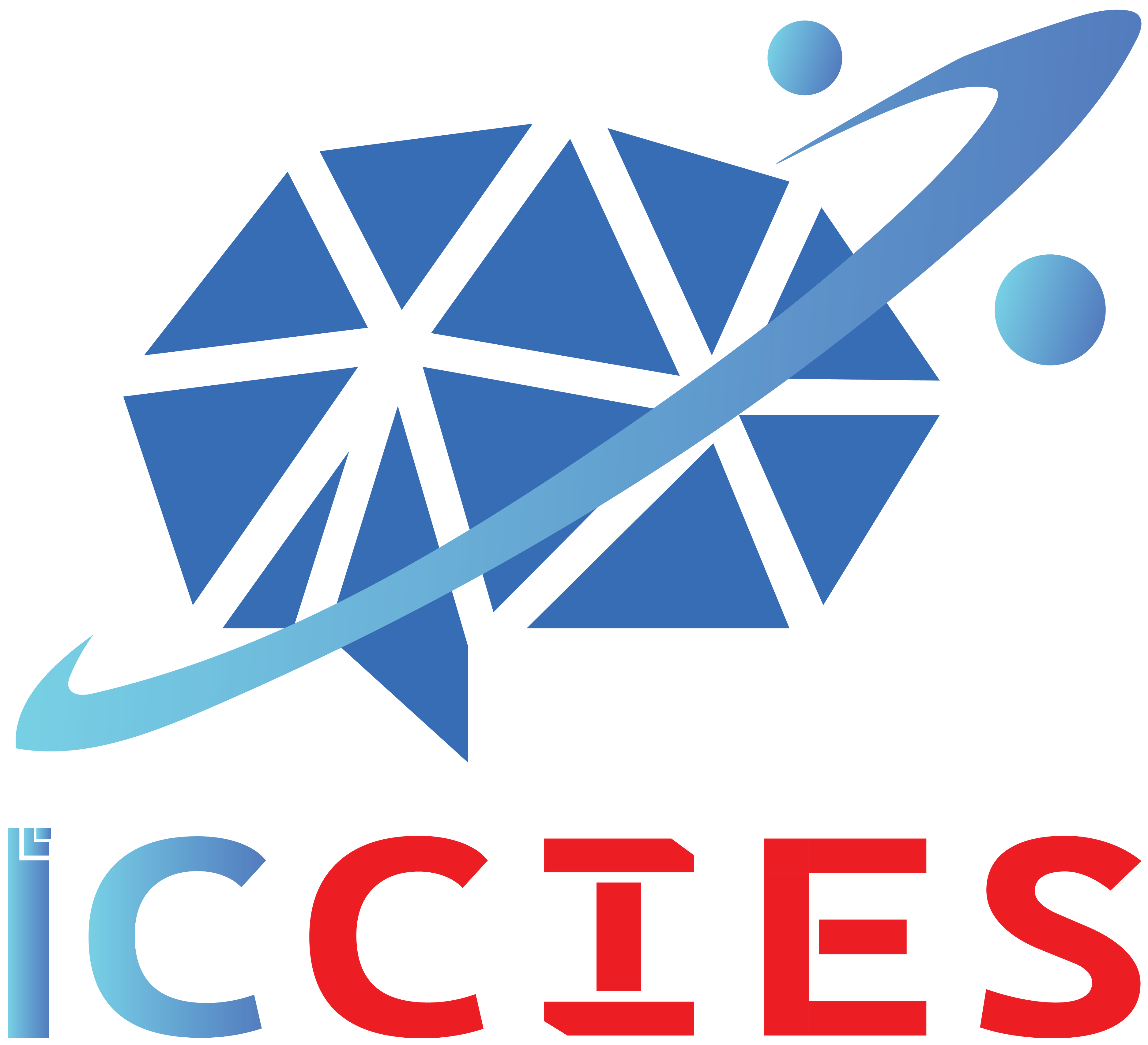Keynote Speakers
Costin Badica
University of Craiova, Romania
DBLP: https://dblp.org/pid/54/2323.html
Google Scholar: Link
ResearchGate: Link
Web of Science ResearcherID: Link
Title
Generalized Similarity Measures for Boolean Models
Abstract
Defining quantitative measures for evaluating the similarity of two objects occurs in various scientific areas including computing, natural sciences, medicine, forensics, socio-economic sciences, engineering, and arts. We provide a closer look at some of the most popular normalized similarity measures for Boolean models. We present: i) generalization of three classes of measures described as generalized Kulczynski, generalized Jaccard, and generalized Consonni and Todeschini, ii) theoretical ordering of the similarity measures inside each class, as well as between classes, and iii) positive and negative results regarding the metric properties of measures related to satisfying or not satisfying the triangle inequality axiom. Finally iv) we provide on outlook for generalizing some of these results to similarity measures on arbitrary lattices.
Bio
Costin Bădică is Professor of Computer Science at the Department of Computers and Information Technology, University of Craiova, Romania. He is Director of the Doctoral School “Constantin Belea”, Co-chair of Technical Committee on Computational Collective Intelligence, IEEE SMC Society and Associated Member of the Romanian Academy of Technical Sciences since 2024. He is also the co-initiator of the Intelligent Distributed Computing (IDC) series of conferences that were held yearly since 2007.
His research interests are in the areas of Artificial Intelligence, Multi-Agent Systems, Distributed Systems and Software Engineering. He has published more than 200 papers in journals, books and conference proceedings. He has participated in more than 20 research projects (Romanian, Eureka, FP7, KA+ Erasmus, bilateral Greek-Romania, Poland-Romania) on various topics: e-business, information extraction, Semantic Web agents, disaster management, electric vehicles, job market.
He is member of the editorial board of many international journals (Computer Science and Information Systems ComSIS / ISSN 1820-0214, System Theory, Control and Computing Journal / ISSN 2810–4099, Cybernetics and Information Technologies CIT / eISSN1314-4081, Simulation Modelling Practice and Theory SIMPAT / ISSN 1569-190X, and Vietnam Journal of Computer Science / ISSN 2196-8888. He has delivered many keynotes at international conferences and seminars in Romania, UK, France, Poland, South Korea, Morocco, Ukraine, Greece, Spain, Germany, India, South Africa, and Italy.

Yeong-Tae Song
Towson University, Maryland, United States
Title
A Novel Framework for Personal Health Monitoring Using Digital Twin and On-Device AI
Abstract
Timely and appropriate treatment is critical when an individual contracts a disease. However, due to various limitations—such as accessibility, awareness, or logistical barriers—receiving prompt care is not always possible. More importantly, many adverse health outcomes can be mitigated or prevented through proactive monitoring and early intervention. While clinical institutions such as hospitals are essential for diagnosing and treating illnesses, they are not ideally suited for continuous, individualized health monitoring, which often requires real-time assessment and personalized guidance.
With recent advancements in health information technologies, it is becoming increasingly feasible to deliver continuous, personalized health monitoring while ensuring data privacy, security, and controlled sharing. In this talk, we propose a novel personal health monitoring framework that integrates digital twin technology and on-device artificial intelligence (AI).
The digital twin serves as a dynamic, virtual representation of the individual’s health status, continuously updated using clinical sensor data and self-reported symptoms. It enables real-time monitoring, assessment, and prediction of health trends based on longitudinal data. Complementing this, on-device AI provides secure and personalized health coaching by processing data locally on the user’s device—eliminating reliance on external AI services such as cloud-based models or tools like ChatGPT. This architecture enhances data security and aligns with the need for personalized, real-time, and privacy-preserving health management.
Bio
Dr. Yeong-Tae Song is currently a full professor at Towson University in the department of computer and information sciences. He has earned his master’s and Ph.D. degrees in computer science in 1993 and 1999, respectively, from the University of Texas at Dallas. Prior to joining academia, he has worked as a software engineer and ATM software test engineer in industry for more than 8 years in Seoul, Korea and Dallas, Texas.
He has been working on various embedded software for network equipment including ATM switches. After joining academia, he has been working on a telemedicine project with NASA and the medical school in the University of Arkansas at Little Rock. During the tenure at Towson University, he has been PIs for various projects from the state of Maryland and local industries, including EHR/PHR, clinical sensors, smart learning, Voice over IP, and so on. He has been a frequent speaker for conferences and seminars. He has been a program chair and a conference chair for various conferences, including IEEE. He also serves as editor of a few journals. He has published about 100 papers in conferences and journals.

Krystian Wojtkiewicz
Department of Information Systems
Wroclaw University of Science and Technology.
Title
Collective Intelligence for Urban Air Quality: Leveraging Mobile Platforms and Citizen-Generated Data
Abstract
Growing public awareness of air quality, particularly in densely populated urban areas, is reshaping the expectations of both citizens and policymakers. Reliable, high-resolution air quality information is increasingly essential—not only for city officials making decisions about urban planning, traffic management, and public health interventions, but also for individuals seeking to optimize daily choices such as commuting routes and residential locations. However, the demand for granular air quality data, at spatial resolutions of 50–100 meters, presents significant challenges. The sparse distribution of official monitoring stations limits the accuracy and relevance of traditional models, a challenge actively addressed by initiatives like the AIR-PPM Hackathon, which harness collaborative and AI-driven approaches to improve prediction capabilities.
Simultaneously, the proliferation of public and private monitoring devices—including networks of low-cost sensors such as Airly—has created a wealth of new data sources. While these sensors cannot be treated as reference-grade, they provide valuable, real-time measurements with varying degrees of trustworthiness. The HAPADS project directly addresses the need for higher-quality, autonomous, and programmable air quality sensors, enabling more reliable and mobile data collection. In this context, collective intelligence is a powerful solution for integrating heterogeneous data streams with uneven trust factors. Its approach enhances the precision of urban air quality modeling and prediction and democratizes access to information.
Bio
Dr. Krystian Wojtkiewicz is an Assistant Professor at Wrocław University of Science and Technology and is the Head of the Research Laboratory in the Department of Applied Informatics in Poland. He obtained his Ph.D. in Control and Robotics from Opole University of Technology in 2019, where his doctoral research centered on the “Unified Process Metamodel.”
As a researcher specializing in applied informatics, Dr. Wojtkiewicz emphasizes practical and interdisciplinary problem-solving approaches. Since he joined WUST, he has been at the leading edge of applied informatics research. He has authored over 30 scholarly papers and multiple book editions and regularly reviews submissions for prominent conferences and journals. With extensive experience leading large-scale research initiatives, he has successfully managed interdisciplinary teams and complex projects in applied informatics.
Dr. Wojtkiewicz deeply engages in several research areas, including databases, knowledge systems, computational linguistics, and semantic networks. His work also delves into possible worlds theory and the behavioral aspects of knowledge. In addition, he investigates design patterns and innovative database applications alongside elements of collective intelligence such as modeling, prediction, and assessment.

Van-Nam Huynh
Japan Advanced Institute of Science and Technology (JAIST).
Title
Explainable and Privacy-Preserving Machine Learning for Data-Driven Decision Support
Abstract
As AI systems are increasingly deployed for data-driven decision support, concerns around explainability, privacy, and hallucination have become central to responsible machine learning. This talk first discusses these challenges and then explores the intersection of explainable and privacy-preserving machine learning, presenting a learning framework designed to enhance model transparency and protect sensitive data. We demonstrate the effectiveness of the developed models through two case studies in financial and medical domains. These examples illustrate how integrating explainability and privacy into model design can improve both trustworthiness and utility in real-world applications. Finally, we conclude with directions for further research.
Bio
Van-Nam Huynh is a Professor of the Graduate School of Advanced Science and Technology, Japan Advanced Institute of Science and Technology (JAIST). He received his Ph.D. in Mathematics from Vietnam Academy of Science and Technology in 1999 and a Habilitation in Informatics from Université de Technologie de Compiègne, France in 2012. He has also served as a visiting professor at The University of Trento, Italy in 2024 (2 months), National Electronics and Computer Technology Center (NECTEC), Thailand in 2019 (one month), and as an adjunct professor at Chiang Mai University, Thailand since 2017. His research interests include data mining and machine learning, privacy preserving deep learning, modeling and reasoning with uncertainty, argumentation, multi-agents, recommender systems, decision analysis, kansei information processing and applications. He currently serves as an Area Editor for the International Journal of Approximate Reasoning and the journal of ARRAY, Editor-in-Chief of the International Journal of Knowledge and Systems Science.
